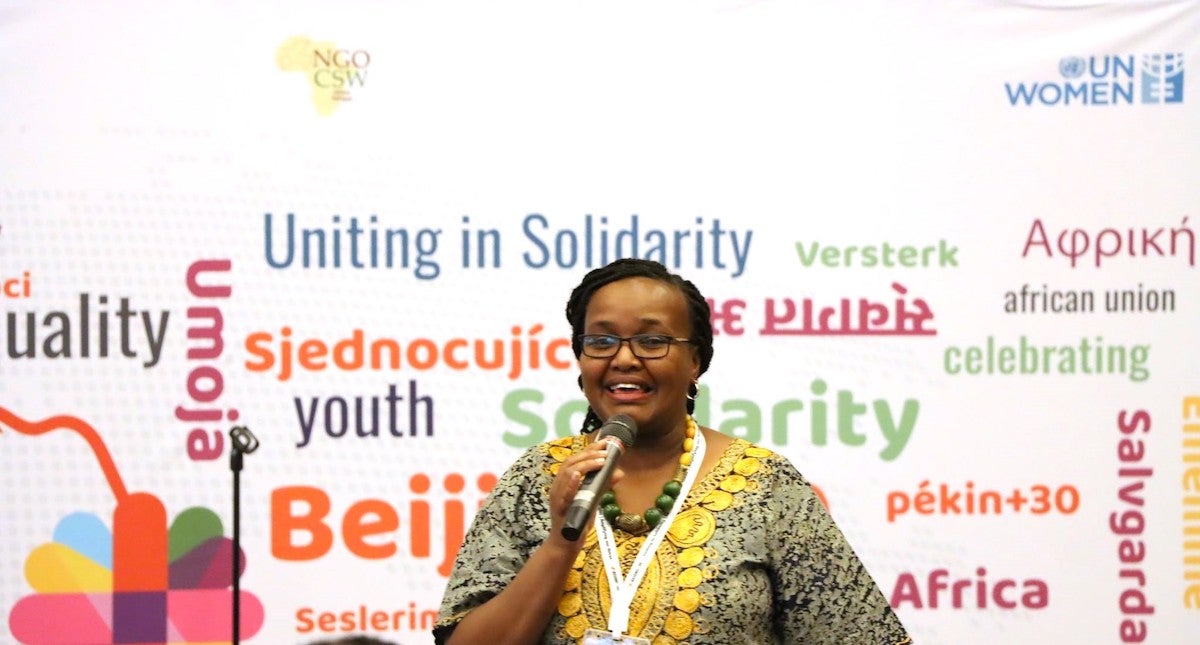I am Generation Equality: Rachel Kagoiya
Date:

I am Generation Equality because…
I strongly believe that grassroots women have the knowledge and strength to lead in climate action and inspire a more sustainable, just world. I am Rachel Kagoiya, Executive Director of GROOTS Kenya, a national grassroots movement founded in 1995, shortly after the adoption of the Beijing Declaration and Platform for Action. At GROOTS Kenya, we stand together in sisterhood, committed to strengthening grassroots communities and pursuing climate and economic justice.
How is your organization making a difference under the Generation Equality commitments?
GROOTS Kenya is a Commitment Maker under the Generation Equality initiative. We work under the Feminist Action for Climate Justice Action Coalition, where we strengthen the climate change resilience for grassroots women in Kenya. Over the years, we have worked with grassroots movements to strengthen their capacities to mitigate and adapt to climate change.
Our approaches include empowering grassroots women to adopt agroecology practices, an indigenous farming practice that uses local knowledge, tools, and natural soil enrichment techniques. This method promotes crop diversification but also preserves soil health, benefiting community well-being, environmental resilience and food security.
In addition, GROOTS Kenya elevates the voices of grassroots women, allowing their unique perspectives on climate justice to influence policies from the local level to national and global levels. By sharing their climate experiences and insights on global forums, grassroots women continue to drive meaningful and actionable change. We believe that sustainable solutions are achieved when those most affected by the impacts of climate change are heard and actively involved in decision-making.
How do we leverage the multi-stakeholder approach to accelerate the implementation of the Beijing +30 declaration platform?
Although progress has been made since 1995, no country has achieved full gender equality. The Beijing Declaration's aspirations and commitments have been hindered by a lack of accountability mechanisms and dedicated funding for implementation.
Generation Equality’s multi-stakeholder approach brings together a broad range of actors - from governments and grassroots movements to youth-led organizations, private sector partners, and philanthropies to promote gender equality. For example, governments provide policy and regulatory support, grassroots drive local-level advocacy, young people are leading with innovative perspectives, while the private sector and philanthropies contribute to essential funding and resources. This diversification can mobilize more comprehensive solutions through policy reform, advocacy efforts, resource allocations, and increasing public awareness.
This multistakeholder approach promotes increased cross-sectoral dialogues on workable solutions and practices. Fostering effective communication between and across communities can help bridge existing gaps and allow active participation in Generation Equality.
The Generation Equality Forum strengthens the implementation of Beijing +30 by creating a multi-stakeholder framework to mobilize resources and ensure inclusive dialogue. This approach cultivates a unified commitment to advancing meaningful, lasting progress on gender equality through a cohesive and collaborative effort.Parte superior do formulário
Three ways you can be part of Generation Equality:
- Advocate for climate justice: amplify grassroots women's initiatives, indigenous knowledges and stories of climate resilience.
- Engage in or support multistakeholder partnerships on gender equality at the policy, advocacy, and community levels.
- Empowerment of communities via sustainable agricultural practices like Agroecology will go a long way in preserving natural resources and transforming food systems.
Quote: “Although there has been progress made since 1995; no country has achieved full gender equality. The Beijing Declaration's aspirations and commitments have been hindered by a lack of accountability mechanisms and dedicated funding for implementation” - Rachel Kagoiya